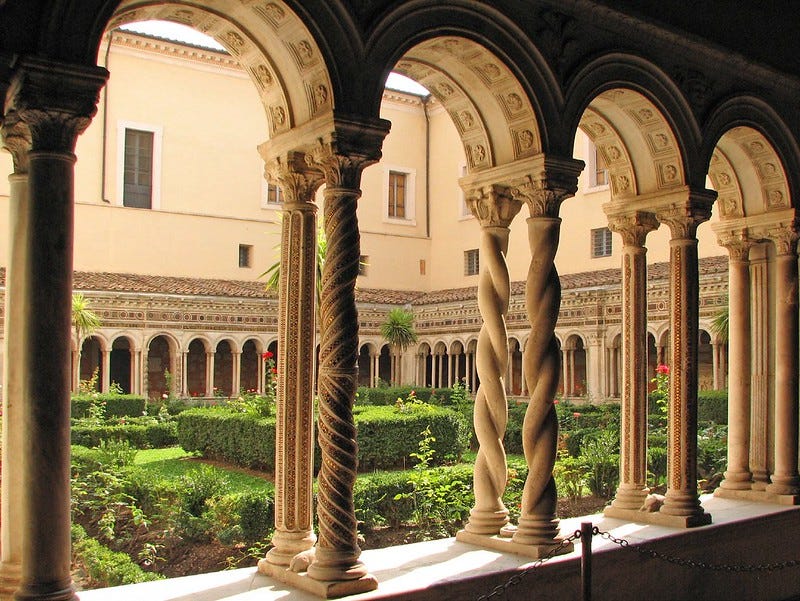Gregorian silence: on cloistering the tongue and hearing the music of Christ
Inclining the ear of the heart in the Mass, schoolroom and fields
In the treasury of the Church’s Tradition, surely the songs which the Bride has sung to her Bridegroom over millennia are to be counted among her most precious jewels. That such sacred music should bear the appellation “Gregorian chant” is high praise for a Benedictine monk already memorialised as “Great”, who wears the crowns of saint, pope, Father and Doctor of the Church. I do not wish to dwell on his vast achievement in compiling the chants of the Church; that is a topic which many could treat of with far more nuance than I could ever provide. It is rather the silence in which St. Gregory learned to hear Christ as musica sacra, that I wish to dwell on.
Gregorius Magnus inclined the ear of his heart in silence, for music is born out of silence. John Senior described music as “the voice of silence” pointing out that the word music draws its roots from silence as the words “mute” and “mystery” both convey. Beyond the etymology, there is, I intuit, a spiritual priority of silence before music, a priority which is made vividly clear in St. Gregory’s life and writings.
Having found that calm harbour of the monastery, Gregory was loathe to leave its safety and set upon the turbulent waters of ecclesiastical governance. In a homily we read of the ache in his heart for the cloister which obedience had snatched him from. In commenting on the verse from Ezekiel, “Son of man, I have appointed you as watchman to the house of Israel” (Ezek. 3:17), he pours forth:
“These words are hard to utter, for when I speak it is myself I am reproaching. I do not preach as I should nor does my life follow the principles I preach so inadequately. I do not deny that I am guilty, for I see my torpor and my negligence. Perhaps my very recognition of failure will win me pardon from a sympathetic judge. When I lived in a monastic community I was able to keep my tongue from idle topics and to devote my mind almost continually to the discipline of prayer. Since taking on my shoulders the burden of pastoral care, I have been unable to keep steadily recollected because my mind is distracted by many responsibilities…My mind is sundered and torn to pieces by the many and serious things I have to think about. When I try to concentrate and gather all my intellectual resources for preaching, how can I do justice to the sacred ministry of the Word? I am often compelled by the nature of my position to associate with men of the world and sometimes I relax the discipline of my speech. If I preserved the rigorously inflexible mode of utterance that my conscience dictates, I know that the weaker sort of men would recoil from me and that I could never attract them to the goal I desire for them. So I must frequently listen patiently to their aimless chatter. Because I am weak myself I am drawn gradually into idle talk and I find myself saying the kind of things that I didn’t even care to listen to before. I enjoy lying back where I was once loathe to stumble. Who am I - what kind of watchman am I? I do no stand on the pinnacle of achievement, I languish rather in the depths of my weakness.” (Gregory, Homily on Ezekiel, Book I, 11)
Deep humility and compunction of heart cut through this saint’s words! I am sure we all can sympathise that despite our desires, the circumstances of life seem to undercut our intentions. Sleep-deprived mothers and fathers tending infants and rearing boisterous children; attempting to steal a quiet moment before they wake or during naptime only to clean up a mess, break up a fight or offer some comfort. Or perhaps returning from a retreat feeling spiritually refreshed, we quickly find that the daily frenetic grind has depleted us of resolutions forged in the fire of intensely recollected prayer. Where did I go wrong this time? Why do I keep backsliding? Yet it is no small consolation to realise that we are not alone in the struggle, as a great saint appears to lament first hand his dissipation amid the noise of the world. I think any soul striving for peace in Christ can appreciate the sincerity of Gregory’s pining for silence. Indeed, the humility and compunction of his heart is very likely the result of experiencing the same irresolution and distraction we allow to overtake us in the fight for interior recollection. If this seems doubtful, one only has to read Gregory’s profound insight into the struggle of holding one’s tongue:
“Furthermore, be it known that they are lost to the whole estate of righteousness altogether, who let themselves go in mischievous words. For the mind of man, like water, both when closed round is collected on high, in that it seeks anew the source whence it descended, and when let loose it comes to nought, in that it dissipates itself to no purpose down below. For the mind is as it were drawn out of itself in so many streams, as it lets itself out in superfluous words from the strict control of silence. And hence it has no power to turn back within to the knowledge of itself, in that being dissipated without in much talking, it loses the strength of interior reflection. Therefore it lays itself bare in every part to the inflictions of the plotting enemy, in that it does not hedge itself about with any defence for its safe keeping. Whence it is written, He that hath no rule over his own spirit in his talk, is like a city that is broken down, and without walls. Prov. 25:28. For because it is without the wall of silence, the city of the mind lies open to the darts of the enemy, and when it casts itself forth of itself in words, it exhibits itself exposed to the adversary, and he gets the mastery of it without trouble, in proportion as the soul that he has to overcome combats against its own self by much talking.” (Gregory, Moralia in Job, Book VII)

A wall of silence serves as a guard around the city of our mind. This is the wisdom of the Regula of St. Benedict that Gregory adopted as his own. One of the reasons I prefer to pray the hour of Prime from the breviary is because of its proper hymn, Iam lucis orto sidere, which is chanted daily. The hymn puts us on guard against all the main occasions of sin we constantly face, not least sins of the tongue. “Linguam refrenens temperet, Ne litis honor insone: Visum fovendo contegat, Ne vanitatis hauriat” - “May He restrain our tongue and make it yield, Lest it bring forth the clamor of discord: May He with tender nurture our sight shield, Lest in our heart vain memories be stored.” There is a tone of urgency in Prime which borders the beginning of the day, the last hora of the breviary before beginning work and converse with others. The multiple supplications to God in this office never gets old to me, as a reminder to beg God’s grace to avoid sin at all costs, under all its guises, each and every single day. Out of this disposition, guarded by silence and humility, the prayer of the Church prepares us to face the music!
Gregorian silence as much as Gregorian chant has deep import for cult, culture and cultivation alike. It is not merely that we are disposed to hear, but that we can listen attentively from this state of soul. St. Benedict did not begin his rule with the verb audi, listen, but ausculta, which means to hear with attention. “Ausculta, o fili, praecepta magistri, et inclina aurem cordis tui” - “Hear, my son, the precepts of the teacher and incline the ear of thy heart”. It is the kind of obedient listening that a watchful servant pays to his master; it is also the kind of intense listening in silence that one is able to overhear a whispered secret.
In the spirit of auscultatio, we can attend to the peace of Christ in a Low Mass or be elevated by His glory in a Sung Mass. I am reminded here by a striking distinction Dr. Peter Kwasniewski makes regarding Masses offered as silent, sung and spoken: “Song is the realm of the lover, the mourner, and the bacchante, of heightened experience, of exultation and nobility, of beauty finding its voice. Silence is the realm of mystics in the grip of ineffability, genius concentrating on a problem, poets reminiscing and reaching for a word, the simple man confronted with realities vastly greater than himself, like love and death. Speech, for its part, is the realm of the ordinary, the matter-of-fact, the realm of commerce and politics. This is why both sung liturgy and silent liturgy are glorious, effective, and rich, each in its own way, while spoken liturgy is pale, feeble and impoverished, a failure off the blocks. We are looking at a phenomenological difference that goes to the very heart of worship – what we are doing, towards whom, by whom, and why” (Peter Kwasniewski, Noble Beauty, Transcendent Holiness, 245)
It has been my own experience that grappling with the protracted stretches of silence accompanying the action at the altar, as well as following the drawn out lines of a gradual or tract have been a real novitiate in cultivating auscultatio. Pushing back wandering thoughts on the inside (and often ignoring wandering children on the outside!) demands a certain asceticism when assisting at the Traditional Mass. It does seem that when one can hear the voice of the priest constantly, most often enhanced by a microphone, there remains no space in the church to hear with the ear of our heart, to engage with the prayer of the Mass in a mode which goes beyond merely hearing every word aloud.
The same holds true for the schoolroom. A truly “musical education” that engages the emotions, imagination, memory, understanding and will of the child first demands silence that engenders deep listening. I cannot improve upon the genius of John Senior here: “ [S]t. Benedict explains the condition, disposition, mode and motive of learning. “Ausculta” he whispers. “Hear.” And of course that means Benedictine silence. In order to hear one must be still, both without and within. The first monk and paradigm of students was Elias who discovered, we remember, that the Lord of truth is “not in the wind … not in the earthquake … not in the fire … but– sibilus aurce tenuis–in the whistling of the gentle air,” … What would it mean really to have a silent mind? Silence is not just the absence of noise any more than peace is the absence of war. It is rather a positive and difficult accomplishment, a state of justice in the soul in which according to the classical formulation stretching back to Plato, each part receives its due in the performance of its proper function–the passions to give affective force in accomplishing the dictates of the will, the will to execute the commands of reason and reason to receive the truth; truth from without in abstracting essences from sense-particulars, truth from within in recognizing principles, and truth from above in obedience to grace. All that in the single word, ausculta–“hear.” Those whose work is in the liberal arts and sciences, as students and professors, must blush to be reminded that it is only to the just, gazing in rapt silence like a lover on his beloved at the art or thing, it is only to the patient, silent, receptive listener, that the meaning of the poem, or the mystery of the number, star, chemical, plant–whatever subject the science sits at the feet of–is revealed…” (John Senior, The Restoration of Christian Culture, 92-93)

When working out in the fields of my farm, most often alone, dirty, tired and at times just downright cranky, the silence of solitude can seem stifling. Yet underneath the original penance of tilling soil through thorn and thistle, there is a pax. Cardinal George Pell once preached an Easter vigil homily that the peace of our Lord offers us is real, but it doesn’t come cheap. It was for this precious pax that hoards of monks journeyed out of town and city and into lonely forests to find their desert, their cave. The account given by St Bernard of Clairvaux’s biographer gives us a glimpse into their mentality. Worn out by rigorous penances performed in his first fervour, St. Bernard was a paper-thin novice often bed-ridden and unable to help with manual labour: “His greatest grief was not to be able to share the fatigue and rough work in which his brethren were employed. He lamented before God the sad incapacity which prevented him from serving the monastery by the labor of his hands; nevertheless, by dint of application and perseverance, he at length succeeded in digging the ground, chopping wood, and carrying it on his shoulders. Whilst he was engaged in these exterior works, his brethren were admiring his profound recollection; he came and went, ready for every service, showing even in the least things an extraordinary zeal; and in the midst of these multiplied and fatiguing occupations, he was ever attentive to the voice which speaks to the heart, ever consumed in the living fire of love, ever in intimate communication with the Source of divine light. He always preserved a grateful remembrance of this kind of life, at once active and passive, which was to him a season of abundant grace and rapid progress. ‘He declares it still’, says the monk already cited; ‘he avows that it was principally in the fields and woods he received, by contemplation and prayer, the understanding of the Scriptures; and he is in the habit of saying pleasantly to his friends, that he had never had any other master in this study than the beech trees and oaks of the forest.’ ” (Abbe Theodore Ratisbonne, St Bernard of Clairvaux: Oracle of the Twelfth Century, 50)
The fact is we may sometimes feel or even often feel, in a given season of life, unreceptive to a good God sets before us: failing to take in the quiet contemplation of a missa lecta or not being carried off into a higher prayer by the chant of a sung Mass as we ought; or perhaps as teachers or home-schooling parents, or students ourselves, failing to be impressed by the truth that lay before us; or again, the freneticism of the household or workplace feels like a clipping of our spiritual wings. Even still, a saint like Gregory bears witness to nevertheless zealously striving after a silence in our hearts that will allow us to hear the music of Christ in all these melodies of His truth, beauty and goodness. There is no other way up or out. Agere contra! It is our part to act against the distractions, disappointments, inclinations and attachments that threaten to be a wall of white noise barricading our souls. Not to mention the “blue” noise of technology infiltrating its way into every neuron and synapse of our brains! Lent is that season where, with God’s grace, we can strive to incline the ear of our hearts once more, as Gregory did, by devoting “ourselves to tearful prayers, to reading and compunction of heart, and to abstinence.” (Regula S. Benedicti, ch. 49)
St. Gregory the Great, ora pro nobis!
Pax,
Mark Cornelius




